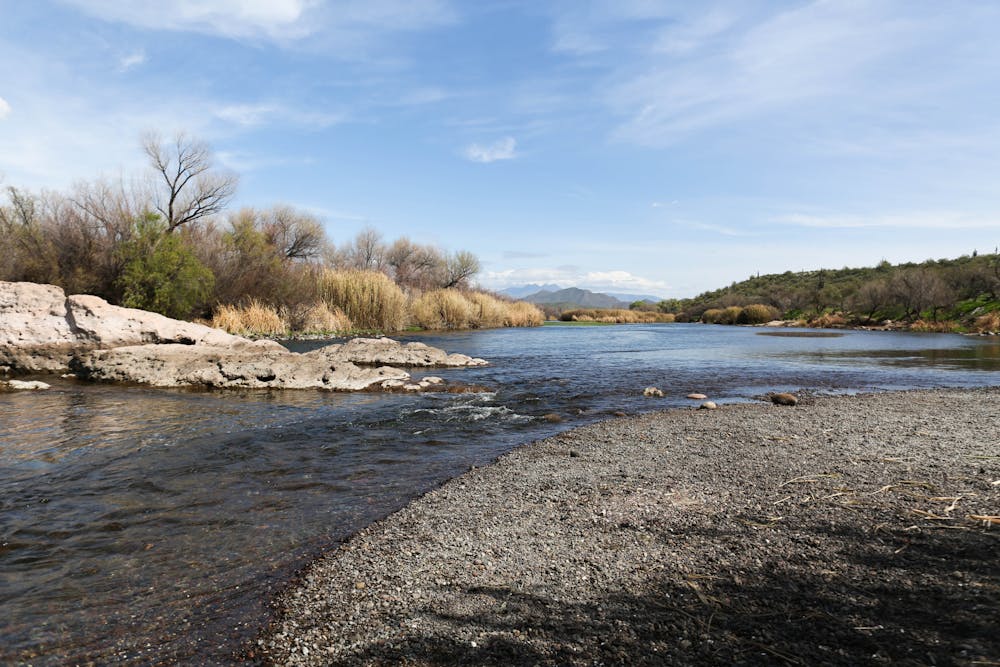Despite a quiet presence on campus, The Rio Reimagined initiative at the University has a sizable mission — to strengthen collaboration across jurisdictions in the Salt and Gila River corridor.
The project unites six cities, two tribal nations and Maricopa County to reduce oversights in government projects. It involves state and federal partners, private businesses and non-profit organizations to accomplish its goals. It also seeks participation from Valley residents, including University students and staff.
The University helms the initiative, assembling several employees to manage the project and work alongside the river communities.
It was started in 2018 to bring governmental and non-governmental partners together according to Maggie Soffel, the senior director at Rio Reimagined at ASU.
"(It's) a regional river revitalization initiative — working together to restore, sustain and enhance over 55 miles of the Salt and Gila River corridor," said Soffel.
Soffel said the University helps coordinate existing efforts, bringing partners together bi-monthly and securing grant funding. Another goal of the Rio Reimagined is to help organizations share information.
Cindi Ptak is the project's ambassador to the Urban Waters Federal Partnership, a government program dedicated to improving U.S. cities' water systems. She said coordinating with the federal government brings her personal fulfillment.
"I really do believe that we're really manifesting success here," Ptak said.
Soffel and Ptak attended an open house workshop hosted by RIO PHX in south Phoenix on Tuesday evening, where local citizens were invited to provide feedback for Salt River development.
RIO PHX is a collaboration between the city of Phoenix and stakeholders to attract investment to the Salt River's banks, according to its website.
Soffel also said the project allows students and faculty to connect with the broader community off campus grounds.
Audrey Nagle and John Demcko, two graduate students studying urban and environmental planning, came to the event to research public opinion concerning the plans.
"We're trying to get some idea about what the community actually wants for the area," Nagle said.
For Phoenix resident Jenifer Janniere, the workshop was an opportunity to improve her business. As a real estate agent, she said she would use what she learned at the event to help her clients.
"A lot of my neighbors live in a new-build community, and they're struggling with the area," Janniere said. "This vision will give them a little bit more patience and see that the area is developing."
Enrique Bojórquez, a planner for the city of Phoenix who helped put on the event, said it was intended to share city success and get feedback on design concepts.
"There's a lot of community interest along the Salt River," Bojórquez said. "You can see that from the community that we have here in the open house."
Bojórquez said the many citizens, organizations and institutions that attended the workshop are excited to build momentum for the project.
Momentum is on mind for Soffel as well — a major goal for Rio Reimagined is to reinforce collaboration efforts with the University.
READ MORE: Tempe Town Lake's impact on ASU after 25 years
"Faculty and students are able to participate in projects and community events from a volunteer perspective," Soffel said.
Soffel also discussed the work Rio Reimagined has done to integrate the urban and environmental planning master's program, which Nagle and Demcko are involved in, into its design process.
Soffel said the initiative helps to fulfill the University's goal of being "socially embedded here in the Valley."
"ASU has a role in serving the communities in which we sit," Soffel said. "The University is here to support that growth and development of the community that the University calls home."
Edited by George Headley, Sophia Ramirez and Alysa Horton.
Reach the reporter at coyer1@asu.edu and follow @carstenoyer on X.
Like The State Press on Facebook and follow @statepress on X.
Carsten Oyer is a sophomore studying journalism and mass communication, as well as public service and public policy. This is his second semester with The State Press, having previously worked as a politics reporter.




